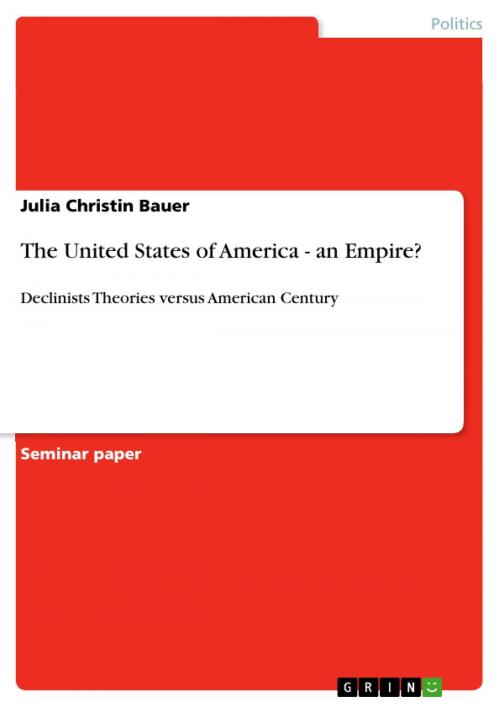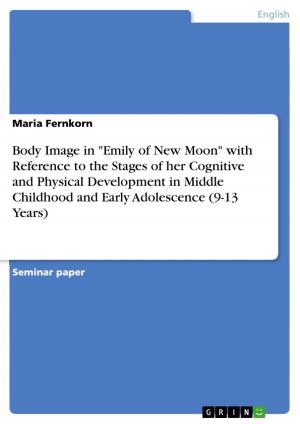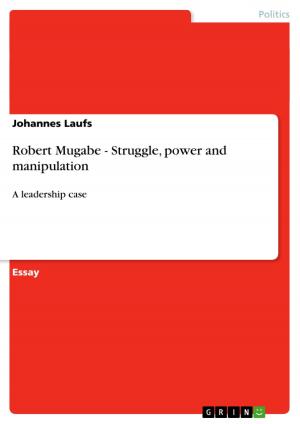The United States of America - an Empire?
Declinists Theories versus American Century
Nonfiction, Social & Cultural Studies, Political Science| Author: | Julia Christin Bauer | ISBN: | 9783640225231 |
| Publisher: | GRIN Publishing | Publication: | December 5, 2008 |
| Imprint: | GRIN Publishing | Language: | English |
| Author: | Julia Christin Bauer |
| ISBN: | 9783640225231 |
| Publisher: | GRIN Publishing |
| Publication: | December 5, 2008 |
| Imprint: | GRIN Publishing |
| Language: | English |
Seminar paper from the year 2006 in the subject Politics - International Politics - Region: USA, grade: A-, London School of Economics, course: Summer Course: International Politics, 8 entries in the bibliography, language: English, abstract: The end of the 1980s gave rise to many thoughts about the decline of the United States of America. In 1987, Paul Kennedy's theory of a certain inevitable ending for all great powers was often applied to the USA. Furthermore, former US Secretary of State and 1973 Nobel Prize winner, Henry Kissinger, argued that America's Cold War success was 'far more costly for the USA than it could have been.' Only about a decade later, at the end of the 1990s, however, Henry Luce's vision of the USA as a world power experienced a sort of renaissance since 1941, when this vision first arose. Below, I would like to take a closer look at this transformation of perceptions of the United States. In the late 1980s, 'declinists' were certainly not short of incidents proving their rather pessimistic outlook on America's future. In the process of naming some of them, I would like to start with the 1970s, where the US retreat from Vietnam, 58,000 dead American soldiers, and defeat by a Third World country portrayed a great surrender of American power to a communist country. The sentiments of grief, anger, and regret over Vietnam influenced the following years immensely and was also an incentive to a less muscular foreign policy. Furthermore, President Richard Nixon's resignation in August 1974 due to his 'abuses of governmental power' in the Watergate scandal caused a lack of confidence in American politicians and symbolized the ending of a presidency often referred to as imperial. [...]
Seminar paper from the year 2006 in the subject Politics - International Politics - Region: USA, grade: A-, London School of Economics, course: Summer Course: International Politics, 8 entries in the bibliography, language: English, abstract: The end of the 1980s gave rise to many thoughts about the decline of the United States of America. In 1987, Paul Kennedy's theory of a certain inevitable ending for all great powers was often applied to the USA. Furthermore, former US Secretary of State and 1973 Nobel Prize winner, Henry Kissinger, argued that America's Cold War success was 'far more costly for the USA than it could have been.' Only about a decade later, at the end of the 1990s, however, Henry Luce's vision of the USA as a world power experienced a sort of renaissance since 1941, when this vision first arose. Below, I would like to take a closer look at this transformation of perceptions of the United States. In the late 1980s, 'declinists' were certainly not short of incidents proving their rather pessimistic outlook on America's future. In the process of naming some of them, I would like to start with the 1970s, where the US retreat from Vietnam, 58,000 dead American soldiers, and defeat by a Third World country portrayed a great surrender of American power to a communist country. The sentiments of grief, anger, and regret over Vietnam influenced the following years immensely and was also an incentive to a less muscular foreign policy. Furthermore, President Richard Nixon's resignation in August 1974 due to his 'abuses of governmental power' in the Watergate scandal caused a lack of confidence in American politicians and symbolized the ending of a presidency often referred to as imperial. [...]















